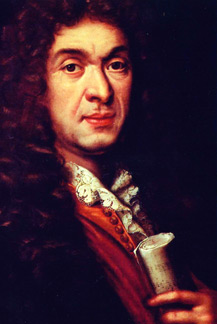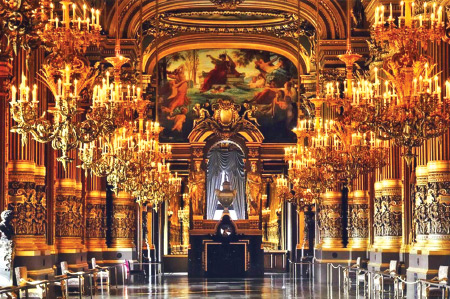|
Jean-Baptiste Lully:
The founder of French Opera
by Gwen Herat
|

Jean-Baptist Lully, inspiration of King Louise XIV. They danced
together and appeared in a ballet together, the score being
Lully's.
|
Those who can lap up opera consider Jean-Baptist Lully out of this
world for his compositions. He had to be great as he was the composer
who founded the French opera. What appeals to me are his ballets both
written with Moliere;
Les Amants Magnifiques (1670)
Le bourgeois gentilhomme (1670)
These ballets composed for the court led to a series of comedie-ballets
that he wrote in collaboration with the dramatist Moliere using
satirical subjects.
But he was so endearing and was able to evolve classical overture
that led to Alcidian from 1658 in fugile middle and slow rhythms. All
these flourished with the support of the king which otherwise would have
earned him a lot of criticism.
The music he wrote and produced at the Academe Royale de Musique
finally took him to the founding of the great Paris Opera whereas the
Academic was really the first French national opera house where in the
future great opera singers such as Maria Callas, dancers and Rudolf
Nureyev would be featured.
With this done, Lully really found his call in the theatre and along
this love of his, he proceeded to set French text to music with such
great sensitivity and flexibility than anyone else had done before.
He abandoned what had become the Italian convention with endless
vocal décor and repetitive variations arias. He went further to bestow
dramatic interest to choral ensembles (some of which I never enjoyed)
but thankfully, increased the stature of orchestra in opera. He drew his
subject material from Greek mythology with acts and continued music.
This resulted in a genre of entertainment known as the ‘tragedies set to
music’ and led to the development into French Opera Seria.’
How did one man do all these combinations while being among the first
to use the newly invented oboe?
Simple, because Lully was a violinist, singer, dancer, courtier,
stage-manager, director, conductor and a man of business. Lully had
extraordinary energy with a disregard for obstacles if there were any
which overcame with no difficulty.
All these combined to make Lully perfect and flawless and helped him
write the first outstanding minutes'.
Born in Paris in November, 1632, he passed away in March, 1687.
Lully's original name was Gilovan Barrista Lulli. The inheritor of an
unusual start, arabesque mid-years with a bizarre end was the fate of
the Italian-born composer who in the future was to become the founder of
the the famous French Opera.
He was taught music by a Franciscan monk because his father who was a
poor miller was unable to make his gifted son's dreams come true. As he
grew up, he could play the violin and guitar with a beautiful singing
voice. The multi talents in the 14-year-old Lully attracted the
attention of Chevalier de Guise and took him along to Paris to be a
valet to Mademoiselle d'Orleans.
|

The magnificent Paris Opera where all Lully's music was played |
This was an opening for his talents which arose from his habits of
entertaining the domestics in the kitchen with an improvised violin
which caught the attention of Count de Nogent and Lully found a place in
Mademoiselle's private band.
However, due to a misunderstanding between the two that could not
have been resolved, Lully quit her service but an influential cousin of
hers who happened to be the Dauphine (later King Louise XIV) he was
absorbed into his court. Lully who was an excellent dancer shared his
talents with his royal master and the two appeared in a ballet in 1653
which was the first of many such things.
Following this, Lully was appointed to the royal band, the famous
Vingt-quartre-du-Roi and in 1656 he was commissioned to train 16
especially selected violinists.
This led his band being superior to the king's band. The smitten king
lost no time in appointing Lully as the conductor of the King's violins
which was the finest musical ensemble at that time.
With royal blessings, he moved fast increasing his power and
influence in royal music circles and later as one of the King's
secretaries and his most trusted important advisor.
Behind Lully's gentle facade was the shrewd courtier full of
ambition, ruthless, determined and arrogant man.
He was crafty, knew when to be obsequious and when to flatter. He had
studied the king to the hilt. He was appointed as the officials composer
in 1661 and in the following made the official music master of the royal
family. He was earning a staggering sum of sterling pound 30,000 year.
Along with an avariciousness he did not endear himself to his
contemporaries.
To top it all, he received the licence to operate the Academic Royale
de Musique with more patents from the king. Lully was able to establish
a virtual monopoly in the Parisian theatre that made the others despise
him.
The stage work he produced over the theatres in the coming years was
the precedence to a new school of opera. May be his arrogance did
over-run his ego but his genius made others pay homage to him.
He wrote TE DEUM to celebrate the king's recovery from a serious
illness and during its debut performance accidentally stabbed his foot
with a sharp-pointed cane that he used for conducting and later
developed an abscess and died of contracted gangrene, shortly after
blood poisoning.
Among his outstanding Overtures: Cadmus et Hermoine (1673), these
(1675), Psyche (1675) and armide et Renaud (1686)
This was Lully's penultimate opera and was produced posthumously. The
score was considered to be his finest and spectacular achievement. |

